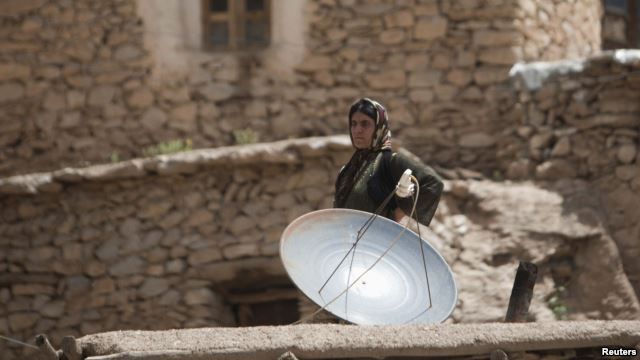 Islamic State (IS) militants are destroying satellite dishes and television receivers in civilian homes to prevent people from watching "dangerous" foreign channels that air anti-IS reports, activists and eyewitnesses in Syria told RFE/RL this week.
Islamic State (IS) militants are destroying satellite dishes and television receivers in civilian homes to prevent people from watching "dangerous" foreign channels that air anti-IS reports, activists and eyewitnesses in Syria told RFE/RL this week.
The move appears to have followed a decree this month to crack down on TV watching.
The decree was first announced on August 7 by imams at IS-controlled mosques in locations including Raqqa, the militant group's de facto capital in Syria, activists told RFE/RL.
Raqqa resident Mohammed al-Ali told RFE/RL that he witnessed the announcement being made in the city's Al Fawwaz mosque during Friday Prayers earlier in August.
Like those of other witnesses cited in this article, Ali's name has been changed for security reasons.
"The imam in the Al Fawwaz mosque is known to be a sympathizer with Daesh," Ali told RFE/RL via WhatsApp this week, using an Arabic acronym for IS.
"He told people gathered for the Friday Prayer that the news aired by Al-Jazeera and Al-Arabiya and other channels is incorrect, baseless, and false and that's why there will be a decision to forbid people to watch TV."
Civilians would be allowed to watch television only on Fridays, and then only programs showing the Koran being recited, Ali said.
Crackdown And Control
IS militants have begun to enforce the decree in the town of Al Shaddadi in Hasaka Province's southern countryside, entering civilian homes and smashing equipment, local activists say.
"They are entering houses by force to destroy dishes and satellite receivers," one witness from Al Shaddadi told RFE/RL. Others corroborated the account.
The move is part of a wider campaign by IS to cement its rule by cutting civilians off from the outside world while exposing them to a constant stream of propaganda in its own support.
The militant group -- which seized large parts of northern Syria in Iraq in an offensive last year and announced the formation of a caliphate, a state governed in accordance with Islamic law -- has installed huge TV screens in Raqqa's main squares on which the group airs its propaganda videos.
"They began by installing four TV screens in Al Rasheed garden, [and in] Dalla, Sa'ah, and Naeem squares," Raqqa resident Abu Nasser told RFE/RL via WhatsApp this week.
The militants also spread propaganda via a "Dawa convoy" -- two huge vehicles that are used as screens, Abu Nasser said.
"The most dangerous thing here is that most of the viewers are children," commented Abu Nasser.
TV Is Dangerous
IS is cracking down on TV watching because the extremist group -- whose members have carried out numerous atrocities and rights abuses over the past year -- fears civilians will see foreign news programs denouncing it or showing it in a negative light.
"Daesh considers TV a threat to its own existence," said Hamoud al-Mousa, the founder of the Raqqa Is Being Slaughtered Silently campaign.
IS wants civilians to consume TV entertainment outside the home and only in its specially created "media points," Mousa added, referring to the outdoor booths where IS shows propaganda videos, including to young people.
At the "media points," civilians are able to watch videos showing "how Daesh kills men, women, and children. This is the only available 'news'," the activist told RFE/RL from Turkey where he fled for his own safety.
IS is particularly concerned about controlling access to TV programs aimed at children, Mousa believes.
"Children's programs are dangerous for Daesh because children are normally used by the group to accomplish its goals," he said. "That's why a child should only listen to them and to what they say."
Mousa, whose father Mohamed was detained by IS for 77 days, tortured, and beheaded in Raqqa in mid-June because of his son's activist work, said that IS's Raqqa was reminiscent of Afghanistan under the Taliban, which closed cinemas and banned people from watching TV.
IS has carried out other measures to prevent civilians from interacting with the outside world. In July, the extremist group banned people in Raqqa from accessing the Internet in private homes, allowing WiFi connections only in IS-controlled public cafes.
Source: rferl.org
 В Атырау -10
В Атырау -10